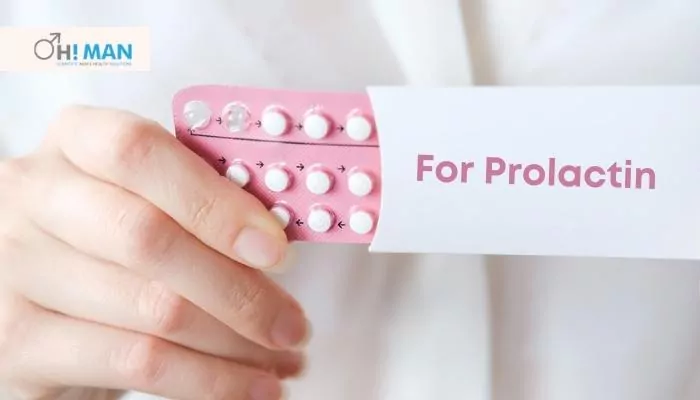Hyperprolactinemia (High Prolactin Levels) : Causes, Symptoms & Treatment
Hyperprolactinemia (High Prolactin Levels) : Causes, Symptoms & Treatment

Men and non-pregnant women with hyperprolactinemia have excessive prolactin levels in their blood. In women, hyperprolactinemia is rather typical.
Hyperprolactinemia affects around one-third of pregnant women with irregular menstrual but healthy ovaries. If this occurs, a woman may find it difficult to get pregnant, or her breasts may begin to produce milk without pregnancy (galactorrhea).
90% of galactorrhea females also have hyperprolactinemia. High prolactin levels prevent other hormones like progesterone and estrogen from being produced normally. So this may change or prevent the ovulation process. Additionally, it may cause missing or irregular menstruation. Some women have excessive prolactin levels and they don’t shown any symptoms.
Excessive prolactin levels in males or hyperprolactinemia in male may cause erectile dysfunction, decreased sex drive, and infertility. Further, untreated hyperprolactinemia might cause a man to produce fewer or no sperm at all.
What is prolactin?
Prolactin is a hormone that primarily regulates milk production, lactation, and mammary gland development inside the breast tissue. Additionally, it supports several physiological activities and processes. Prolactin is mostly produced and secreted by your pituitary gland. However, it may also be produced by the bodily components and systems listed below:
- Immune system
- Mammary glands
- Central nervous system
- Uterus
People assigned male at birth (AMAB), non-pregnant or non-lactating women often have low prolactin levels. Further, they are often higher in pregnant women or nursing.
Hyperprolactinemia Causes
Hyperprolactinemia could be due to several factors and disorders, such as:
- Prolactinoma (most common cause)
- Some medications
- Some health conditions
- Pituitary gland tumours
Sometimes there are no known causes of hyperprolactinemia. Idiopathic hyperprolactinemia describes this condition. After a few months, it often subsides on its own.
Let’s have a close look at various hyperprolactinemia causes.
Table of Contents
Prolactinoma
The most frequent cause of elevated prolactin is prolactinoma. A benign (noncancerous) growth called a prolactinoma develops in your pituitary gland. So it increases prolactin production. In case you develop prolactinoma, you may experience some other symptoms with the symptoms of high prolactin. So this includes:
- Vomiting/Nausea
- Headaches
- Vision changes like double vision or a reduction in peripheral vision
- Sinus pressure or discomfort
- Problems with smell
Medications
Dopamine, a brain neurotransmitter, help reducing your body’s prolactin production. However, your prolactin levels may increase if you take any medicine that interferes with your body’s dopamine levels or usage.
The following medicines may raise your blood levels of prolactin:
- High blood pressure medicines
- Medicines treating nausea or vomiting
- Some antipsychotic medications
- Birth control pills
- Opioids containing pain killers
- Medicines treating gastroesophageal reflux disease (GERD) and heartburn
- Medications treating menopausal symptoms
Three to four days after you quit taking medications, your prolactin levels may return to normal if high prolactin levels are due to any medication. However, never quit a prescription drug without first getting permission from your doctor.
Other Health Conditions
In addition to a prolactinoma, the following medical disorders might raise blood levels of prolactin:
- PCOS
- Hypothyroidism
- Cushing’s syndrome.
- Nelson syndrome
Other Pituitary Tumours
Hyperprolactinemia may be due to large tumours (apart from prolactinomas) present in or close to your pituitary gland. So this is because the tumour blocks dopamine from accessing your pituitary gland, which reduces prolactin. Hyperprolactinemia might result from radiation therapy for tumors on or surrounding your pituitary gland.
Symptoms Of Hyperprolactinemia

Men and women may have different hyperprolactinemia symptoms.
Prolactin might be difficult to identify in males since it affects menstrual periods and milk production. So a doctor takes blood test to check for elevated prolactin levels for a male with erectile dysfunction.
The hyperprolactinemia symptoms in women include:
- Infertility
- Inconsistent menstruation
- Menstrual flow changes
- Pause in the menstrual cycle
- Galactorrhea
- libido problems
- Vaginal Dryness
- Breast Discomfort
The hyperprolactinemia in male symptoms include:
- Abnormal breast development (gynecomastia)
- Impotence
- Low Libido
- Headaches
- Male Infertility
Hyperprolactinemia and Male Fertility
Prolactin may considerably impact sexual function in males when levels greatly increase. According to studies, males with severe hyperprolactinemia (often higher than 35 ng/mL) had decreased libido and premature ejaculation.
High prolactin levels may also affect the synthesis of testosterone and erections. Elevated blood prolactin levels harm male fertility by suppressing the pulsatile secretion of gonadotrophins from the anterior pituitary gland and directly impacting spermatogenesis.
Men planning a baby must identify and treat hyperprolactinaemia since it adversely affects spermatogenesis.
Hyperprolactinemia Diagnosis
If you experience symptoms that imply you have high levels of prolactin, your doctor may consider the following:
- Blood Tests: Blood tests may reveal excessive prolactin production. In addition, they may reveal if the levels of other hormones regulated by the pituitary gland are within the normal range. Generally, a pregnancy test is advisable for women of reproductive age.
- Brain imaging: Through a magnetic resonance imaging (MRI) examination of your brain, your physician may be able to discover a prolactinoma.
- Vision Testing: These may evaluate if a prolactinoma is impairing your vision.
Further, your physician could also refer you to a specialist in treating problems affecting the endocrine system and hormones for further testing (endocrinologist).
Hyperprolactinemia Treatment

Hyperprolactinemia treatment depends on the underlying cause. Some individuals with elevated prolactin levels exhibit no symptoms. Further, they might not require treatment.
In case prolactinoma causes hyperprolactinemia, the treatment aims to:
- Bring prolactin production back within the normal range
- Minimize the prolactinoma’s size
- Reestablish pituitary gland health
Treatment may eliminate or significantly improve:
- The difficulties caused due to elevated prolactin levels such as irregular menstrual cycles, infertility, and libido loss.
- Symptoms or indications of tumor pressure, such as headaches or visual issues
The two primary treatments for prolactinoma are medication and surgery.
Medications
Dopamine agonists are often used orally to address prolactinoma. These medications replicate the actions of dopamine, the brain neurotransmitter that regulates prolactin production. Dopamine agonists can reduce prolactin production and diminish tumor growth. For some individuals with prolactinomas, medications may alleviate symptoms. However, you will often need long-term medication therapy.
If a medicine considerably reduces the tumor size and your prolactin level stays within the normal levels for two years, you may gradually stop taking the drug. Furthermore, only reduce or discontinue your medication after doctor consultation. Additionally, your healthcare professional checks your prolactin levels throughout the treatment. However, before discontinuing your medication, consult your provider.
After discontinuing a medicine, prolactin levels often increase. So if this occurs, your healthcare professional may ask you to resume taking the medication.
Surgery
Your choice of surgery will be heavily influenced by the extent and size of your tumor:
- Nasal Surgery: Most surgical procedures include removing the tumor via the nose (nasal cavity). This operation is known as transsphenoidal surgery. Further, complications are minimal since the surgeon does not deal with other brain regions during surgery. So this operation leaves no noticeable scars.
- Transcranial surgery: If your tumor is big or has spread to neighboring brain tissue, this treatment, also referred to as a craniotomy, may be necessary. So the surgeon removes the tumor from the skull’s upper part.
The tumor’s growth, location, and prolactin levels before operation affect how well surgery goes.
Conclusions
In general, the outlook for hyperprolactinemia is favorable. Prolactinomas, the most prevalent cause of hyperprolactinemia, are often treatable. Hyperprolactinemia is not life-threatening, but it may cause infertility and irregular menstruation. Due to this, it is essential to receive treatment for hyperprolactinemia. If you are having hyperprolactinemia symptoms, see your healthcare professional.
Suppose you don’t have high levels of prolactin and erectile dysfunction is a concern for you. In that case, the experts at Ohman can offer the best, most effective, safe, and FDA-Approved erectile dysfunction medications. Further, our experts can also help you treat premature ejaculation & recommend the best premature ejaculation medications and other non-surgical alternatives to penis enlargement. So book an online consultation with Ohman’s expert and get definitive treatment for your condition.



